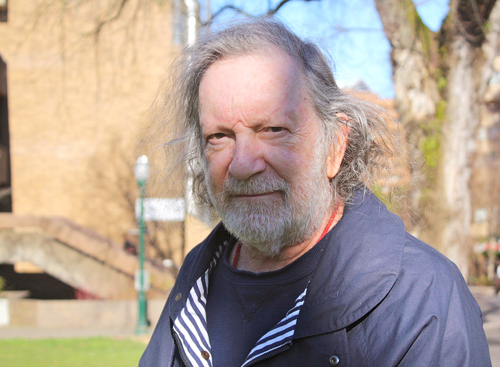He was too young to form memories back then, but Joe Bashlow knows that poet William Carlos Williams was his pediatrician during the Great Depression. His early contact with the poet may have formed his lifelong interest in poetry, which is what has brought the 77-year-old to Portland State.
Poetry enthusiast audits English classes

Cassandra Moore.
He was too young to form memories back then, but Joe Bashlow knows that poet William Carlos Williams was his pediatrician during the Great Depression.
His early contact with the poet may have formed his lifelong interest in poetry, which is what has brought the 77-year-old to Portland State.
“I’ve always had an inclination toward poetry; I think it is a marvelous medium,” Bashlow said. “I think there are more questions in this world than there are answers, and in that ocean of travail, poetry is an island where one can find some meaning, some consolation.
“Though I don’t want to sound too flowery, I think poetry provides a door to your inner self,” he added.
Since his wife of 30 years died two years ago, Bashlow began auditing poetry courses at PSU taught by English professor Tom Fisher. According to Bashlow, their relationship is reciprocally “simpatico.”
“[Fisher] is in touch with the world. He has insights into the facts of life,” Bashlow said. “I think he’s the kind of guy that if you gave a hard-luck story to, it would register, and that’s not always the case.”
Bashlow is now taking his fourth course with Fisher.
For his part, Fisher is delighted to have Bashlow in class.
“I’m very fond of Joe. It’s been a particular delight to see him interact with younger students,” Fisher said. “Many of them are obviously curious about him, and in the last two quarters I’ve noticed more interaction between them before and after class.
“Recently I heard him ask a student, before class began, ‘What do you want to do with your life?’”
Though Bashlow never graduated from a university, he owned his own business as a television engineer.
“Television was pretty new then, and it struck my fancy. I was an only child, I just wanted to get away from home and I was always interested in mechanics. So I had my own little business; I made house calls,” he said.
He worked on Park Avenue in New York City for several years, alongside “big fish” advertising “honchos,” and remembers New York City, “where there is a neighborhood for every calling,” fondly.
Fortunately, he said, he slipped through two wars [Korea and Vietnam], and though he served in the Army for “two crummy years” he never saw combat.
He is old enough to remember collecting scrap metal in Passaic, N.J., his hometown, for government-sponsored scrap metal drives during the last stretch of the Depression and into World War II.
“World War II was a child’s paradise,” Bashlow said. “The army, and war films, rallies and scrap metal drives—things of that nature that kids would get excited about, little realizing what was going on, what made the war a war.”
As for Williams, Bashlow doesn’t remember him, but he knows the poet was generous with his services when people were struggling, and he knows his parents benefited from the poet’s kindness.
“My parents were caught up in the Depression; my father was a working man. Dr. Williams understood that; he was very generous with his services. I think it helped him in his poetry, actually; it gave him a broader purview of what the world was like.”
Those poems, which Bashlow could have recited by memory in his younger days, are now lost to him.
“The bane of my present life is that my memory has eroded significantly: It used to be sharp as a razor blade and it is now as dull as a worn-out hacksaw,” he said. “I mean, I had great recall and knew lots of poems by rote, but now that’s all slipping.”
A slow speaker, Bashlow has a prominent New Jersey accent, longish, wispy gray hair and a white beard. He speaks like a true poet, talking in metaphors, taking his time to find the right words—and he loves puns.
He explained, laughing, that he doesn’t wear his hair long because he’s trying to pose as “some poet,” but for more sentimental reasons.
“I haven’t cut my hair since my wife died,” he said. “She always cut it, and now it just feels like it would be sacrilege to have someone else do it.”
PSU being his first exposure to the university milieu, Bashlow says he is impressed.
He praises the university for welcoming nontraditional students like himself. Having older students in a classroom, he said, “is like dropping some spice in a bowl of spaghetti.”
Fisher agrees. “The general benefit of having the ‘senior auditor’ at PSU is that, in addition to the different perspectives on texts that they might bring as relatively older readers, they model for students the possibility and importance of reading and thinking for their own sake, and of the communities that take place around these things. They’re not there to get credit, but to engage in the kind of experiences that poetry and literature permit.”
Bashlow said he admires the students at PSU. “Part of the fascination I have with [poetry classes] is the caliber of the people who are taking the course,” he said. “In this younger generation there is a seriousness. The students are there for a reason, and their interest in a thing even as esoteric as poetry speaks well for their generation.
“So, in this dismal world that may in some respects be falling apart, there is hope,” he added.





